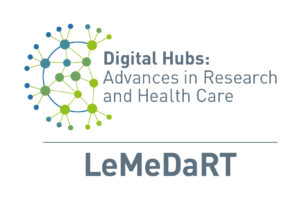LeMeDaRT: supporting health with the smartphone
About the project

The Digital Progress Hub LeMeDaRT (Lean medical data: the right data at the right time), funded by the German Federal Ministry of Education and Research (BMBF), is working to use digitization in medicine to improve care even in remote rural areas.
The distance to the nearest doctor’s office is often quite far in non-urban areas. In medical care, however, a personal approach to patients is important. Digitization can help to improve the situation on site; for example, a smartphone can contribute to optimizing health promotion, prevention and also the treatment itself. Intelligent self-documentation with apps and wearables ¬- i.e., wearable computer systems – can also enable patients to actively participate in the prevention or healing process. Artificial intelligence works in the background on the platforms developed in the Medical Informatics Initiative – naturally while maintaining data protection.
However, other players in the healthcare system also benefit from the implementation of the Medical Informatics Initiative in practice through the Digital Progress Hubs: these include, for example, outpatient medical professionals who can better monitor the symptoms of seriously ill patients in the doctor’s office or during home visits, or the health insurance companies, who can use the results to help them develop better prevention concepts.
For the cooperation partners in the small towns and communities, LeMeDaRT can draw on preliminary work and networking with an already existing cooperation: In the AMBIGOAL project, scientists from the Mannheim Medical Faculty are working out how to establish economically viable health practices in rural areas that improve medical care in a patient-centered, cross-sector approach and digitally supported. Within the framework of this collaboration, a close network between physicians in private practice, medical care centers and university hospitals is to be established.
Three use cases will initially investigate the feasibility of implementation in practice.
Use Cases
Preparation and postoperative monitoring of cancer patients
During a hospital stay – especially when it comes to a disease as serious and complex as cancer – large amounts of relevant data are often generated. But when patients are discharged, further follow-up care has not always been guaranteed until now. However, it would be important for clinicians to know how those they treat are doing as the disease progresses, in order to give further advice or gain insights. The situation is similar in the run-up to a hospital stay: the early exchange of patient data could help to better prepare affected people for surgery by providing concrete instructions for action, thus shortening hospital stays and improving rehabilitation. The hub will enable outpatient and inpatient care to be more closely integrated.
Infection monitoring
In the second use case, the researchers would like to develop a decision-making aid in the event of a pandemic that is tailored to the personal situation of users and can be accessed via an app, for example. The goal is to improve risk assessment and provide a decision aid based on current infection events and the individual situation. Both decision-makers and affected individuals could benefit from a simple visualization based on the current infection situation in combination with other data sets, such as hospital occupancy rates.
Prevention and early intervention in liver disease
So-called non-alcoholic fatty liver disease is becoming increasingly common as a consequence of obesity and lack of physical activity. The disease often goes undiagnosed because it does not cause pain, but it can result in life-threatening cirrhosis of the liver. Regular screening of the liver could help find undetected cases, but is not currently part of the preventive examinations paid for by health insurers. The LeMeDaRT team, in cooperation with a major health insurance company and other health care stakeholders, would like to optimize prevention processes by creating networks that also take into account the shortage of specialists in rural areas. In the future, graduated health care teams and also family physicians could make the necessary examinations. In the event of abnormal results, the relevant specialists would then be involved, for example via telemedicine. This would benefit everyone – physicians in private practice through decision-making aids and up-to-date information from research, patients through short distances, and the healthcare system through the avoidance of duplicate examinations and serious secondary illnesses among its insureds.
Head of the Digital Hub
Prof. Dr. Joachim Fischer
Head of the Digital Hub LeMeDaRT
Center for Preventive Medicine and Digital Health Baden-Württemberg | Medical Faculty Mannheim of the Universität Heidelberg
Partners
- Universität Heidelberg, Medizinische Fakultät Mannheim
Zentrum für Präventivmedizin und Digitale Gesundheit Baden-Württemberg (CPD-BW)
Mannheimer Institut für Public Health, Sozial- und Präventivmedizin
Koordinierungsstelle Telemedizin Baden-Württemberg (KTBW)
Mannheimer Institut für Intelligente Systeme in der Medizin (MIISM)
Institut für Klinische Chemie
Medizinische Klinik II, Sektion für Hepatologie
Chirurgische Klinik - Universität Heidelberg
Institut für Wissenschaftliches Rechnen (IWR)
Institut für Geschichte und Ethik der Medizin (Medizinische Fakultät Heidelberg)
Diakoniewissenschaftliches Institut (Theologische Fakultät) - Regionalverband Nordschwarzwald, Pforzheim
- Medizinisches Versorgungszentrum Calw/Mednos GmbH
- BARMER Krankenkasse
- KV Baden-Württemberg
- HCI2 Health Care Innovation Institute GmbH
- HealthVision GmbH
- SHE AG
- Deutsche Leberhilfe
Further Information

